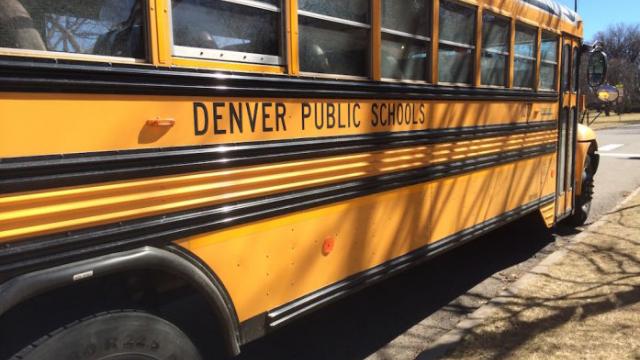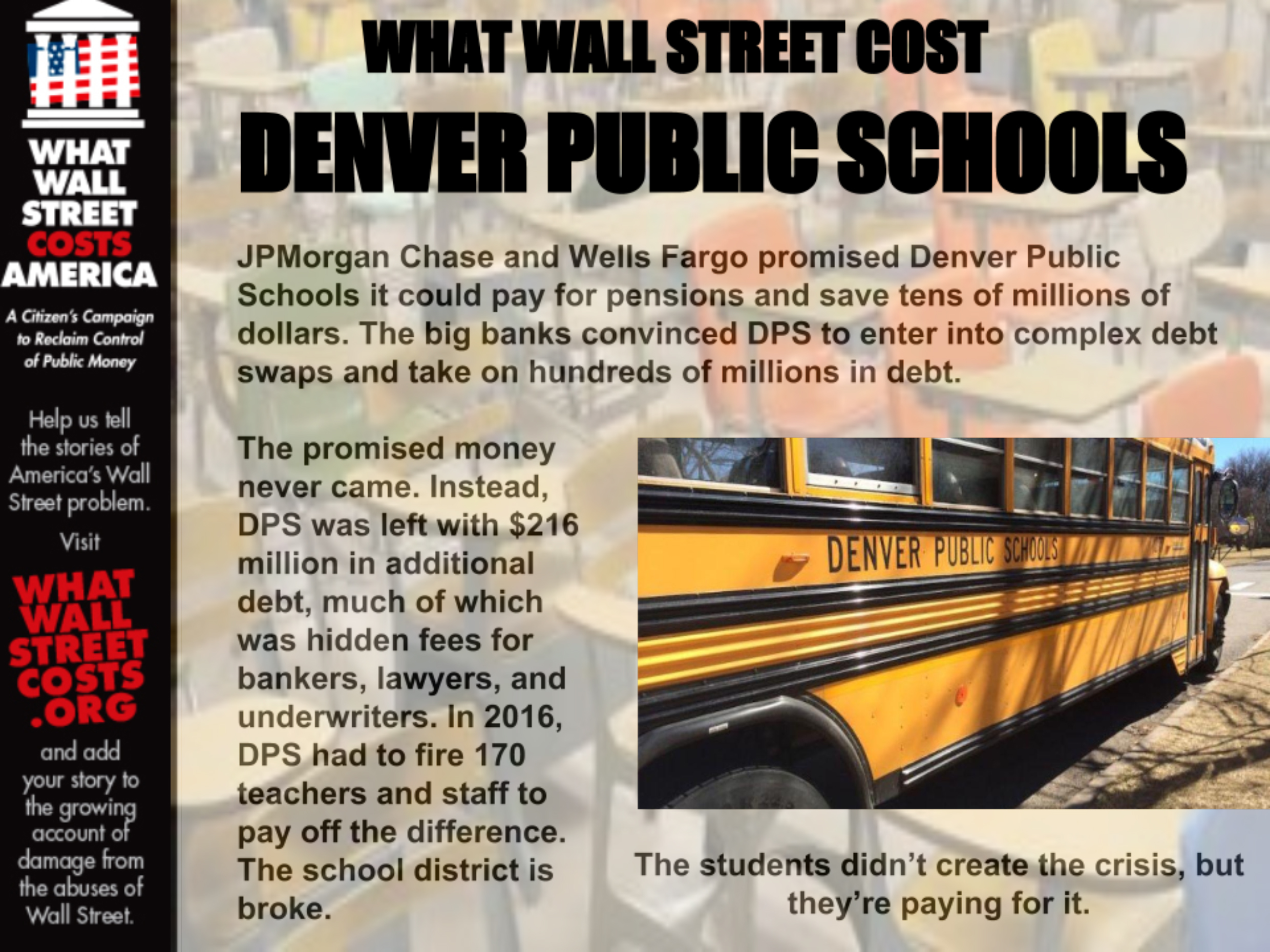
“Why, sometimes I've believed as many as six impossible things before breakfast.” - Lewis Carroll, Alice’s Adventures in Wonderland
If you think Alice inhabited a world of twisted logic and contradictory truths, you should see the world of corporate crony capitalism. Let me tell you how a state awash in extra money is watching its largest school district die due to lack of funds. Alice’s story begins in a rabbit hole. Denver’s story begins on Wall Street.
Unlike many states, Colorado’s economy is strong these days. The state will add over 65,000 jobs this year. New businesses are forming, and existing businesses are doing pretty well. Colorado’s recreational marijuana revenue is also paying huge dividends back to the state, money that will be used to finance education and other public services.
Thanks to Colorado's 27.9 percent marijuana sales tax, the state is now awash in extra money – setting aside $40 million for school construction, $2 million for school bullying prevention programs, and $2 million for drop-out prevention.
In spite of this, Denver Public Schools is cutting 170 faculty and staff positions as the district hobbles economically in the wake of a series of terrible deals it made with JPMorgan Chase and Wells Fargo. The story is a useful illustration of how Wall Street greed can tank economies even in the midst of plenty. And if a couple of amoral firms can weaken a school system in the midst of a healthy state economy, you can imagine how bad things are in places where the economy isn’t as solid as it is right now in the Centennial State.
A little background: Over the past 35 years, as the financial sector has grown exponentially to dominate larger and larger areas of the U.S. economy, and as taxation has become politically unpopular due to decades of right-wing think tanks convincing policymakers that we shouldn't have to pay for stuff, municipalities and states have increasingly turned to Wall Street banks and financial firms to fund basic services, including school districts.
But rather than managing that funding conservatively, Wall Street has lured governments into risky deals and charged outlandish financial fees – hundreds of billions of dollars' worth – leaving government entities broke. Republican and Democratic politicians don't mind; they get kickbacks from the same big financial players. Meanwhile, the “small government” conservatives get to point to the toxic deals and broke governments as proof that governing doesn’t work. The Mad Hatter would be pleased at that logic.
Denver Public Schools fell into the trap. Because Denver’s risk-averse politicians had failed to adequately fund the district’s pensions, they bought the propaganda that Wall Street could help local governments like their make their dollars go further. JPMorgan Chase promised DPS $750 million, and a savings of tens of millions of dollars per year, in a complex debt swap scheme whereby DPS traded its fixed-rates with other entities’ adjustable rates.
At this point, Denver officials would have been wise to take another line from Alice's Adventures: “If you drink much from a bottle marked 'poison' it is certain to disagree with you sooner or later.” Instead of savings, the opposite happened. The value of DPS’s half of the swap tanked, and the interest rates on the other half spiked. When the debt came due, it began costing the district nearly 20 percent of its annual payroll to terminate the deal.
In 2013, the district had to pay another $140 million on top of the botched scheme with JPMorgan Chase to get out of a similar deal with Wells Fargo. Finally, this year, the district paid $216 million to get out of all the other deals in which it had become mired. When all was said and done, Denver Public Schools was spending the equivalent of two-thirds of its annual teaching fees on Wall Street termination fees. Because the district hadn’t made any money on the deals in the first place, the loss was apocalyptic.
A large amount of the $216 million consisted of fees paid to underwriters and other private sector professionals to handle the money. These services, along with a range of alternative financing options, could have been provided under a public financing system that prioritized the stakeholders – DPS students, employees and the surrounding community that benefits from equitable education – over shareholders and highly-paid outside managers.
Why couldn’t DPS have found more careful and sustainable ways to fund its pensions? One reason might be the person who was in charge of the district at the time the deals were made: U.S. Democratic Senator Michael Bennet. Bennet was the head of DPS from 2005 to 2009; DPS entered into the toxic Wall Street deals in 2008. Having worked for the billionaire Phillip Anschutz (owner of AEG, Anschutz Entertainment Group) before becoming a senator, Bennet had met many benefactors, including Goldman Sachs, Jet Capital Investors and Credit Suisse. Those entities, coincidentally, funded his campaign to the tune of hundreds of thousands of dollars. Bennet may not have engineered DPS’s deals with Wall Street, but given his disposition towards big finance, he certainly wouldn't have opposed them.
Looking nationwide, the list of similar transgressions is long. Wall Street ruined Chicago Public Schools too. It turned the City of Stockton, Calif., from a thriving small city to a problem-laden municipality full of crime and poverty. It forced Alabama's largest county into bankruptcy.
Where To Go From Here?
These stories are why Americans are increasingly fed up with entrusting public money to Wall Street. My organization, the Public Banking Institute, is launching a national initiative, What Wall Street Costs America, to document and motivate action to address these injustices. You can visit the project site here and donate to it here. PBI is a 501(c)(3) educational organization.
The problem is likely to get worse before it gets better, since new federal rules on municipal bond measures will make it even harder for cash-strapped cities to issue debt to finance school districts and other public services – meaning they'll be tempted to take riskier ventures with Wall Street firms. At this point, we might invoke another brief exchange from Lewis Carroll's classic book:
“Would You Tell Me, Please, Which Way I Ought To Go From Here?"
"That depends a good deal on where you want to get to."
The Denver Public Schools story is different from others across the nation because in the midst of plenty, DPS students are going without. Teachers and staff are losing their jobs. Wall Street, it seems, can undermine even healthy economies. It's time to look for alternatives in public banks and other democratized financial entities that will allow communities to fund their own projects with their own money. We need to climb out of Wall Street’s destructive rabbit hole.
Matt Stannard is Policy Director at Commonomics USA and a Board Member of the Public Banking Institute.
If you liked what you just read and want to see more original reporting like this on Occupy.com, donate today!
3 WAYS TO SHOW YOUR SUPPORT
- Log in to post comments















Comments
Barbara Baer replied on
why isn't there governence of schools?
excellent piece and it is Alice-like because you can't understand why Denver schools, like other bamboozled public institutions that Wall Street screwed, was so stupid...how can they be!